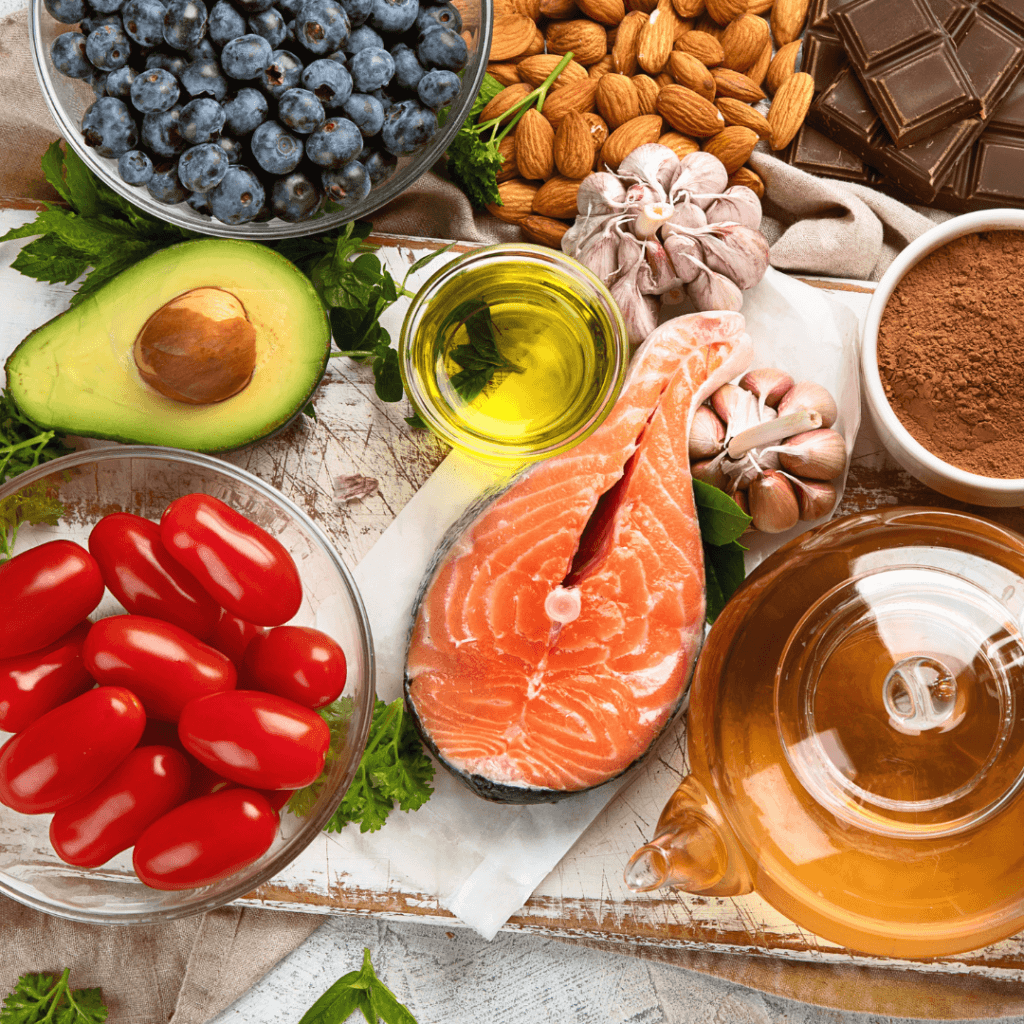Inflammation is your body’s natural defense against injury and infection, but when it becomes chronic, it can wreak havoc on your health—contributing to joint pain, fatigue, brain fog, digestive issues, and even serious conditions like heart disease and autoimmune disorders.
The good news? One of the most powerful tools to reduce inflammation and heal your body isn’t found in a pill bottle—it’s in your kitchen. By making strategic food choices, you can naturally lower inflammation, improve energy, and support long-term health.
Let’s dive into how an anti-inflammatory lifestyle can transform your health and what foods can help you feel your best.
Why Chronic Inflammation is a Problem?
Short-term (acute) inflammation is essential for healing—think of the redness and swelling that happens after a sprained ankle. But when inflammation sticks around too long, it becomes chronic, leading to a host of health issues:
❌Joint Pain & Arthritis – Inflammation damages cartilage, worsening stiffness and discomfort.
❌Heart Disease – Chronic inflammation contributes to plaque buildup in arteries.
❌Autoimmune Disorders – Conditions like rheumatoid arthritis and lupus thrive in an inflamed state.
❌Brain Fog & Fatigue – Inflammation disrupts neurotransmitters, affecting mood and focus.
❌Gut Problems – Leaky gut, bloating, and digestive distress are linked to inflammatory foods.
The solution? Eating foods that calm inflammation while avoiding those that trigger it.
The Best Anti-Inflammatory Foods
- Fatty Fish (Omega-3 Powerhouse)
✔ Why It Helps: Omega-3s reduce inflammation and support joint, brain, and heart health.
✔ Best Choices: Salmon, mackerel, sardines, trout.
✔ How to Eat More: Aim for 2-3 servings per week or take a high-quality fish oil supplement. - Leafy Greens & Colorful Veggies
✔ Why It Helps: Packed with antioxidants, fiber, and vitamins that fight inflammation.
✔ Best Choices: Kale, spinach, broccoli, Brussels sprouts, bell peppers.
✔ How to Eat More: Add greens to smoothies, salads, or stir-fries daily. - Berries & Other Antioxidant-Rich Fruits
✔ Why It Helps: Berries contain polyphenols that combat oxidative stress.
✔ Best Choices: Blueberries, strawberries, raspberries, oranges.
✔ How to Eat More: Snack on fresh berries, add to oatmeal, or blend into smoothies. - Healthy Fats (Nature’s Medicine)
✔ Why It Helps: Reduces inflammation and stabilizes blood sugar.
✔ Best Choices: Avocados, extra virgin olive oil, nuts (almonds, walnuts), flaxseeds.
✔ How to Eat More: Use olive oil in cooking, snack on nuts, and add avocado to meals. - Turmeric & Ginger (Natural Anti-Inflammatory Superstars)
✔ Why It Helps: Curcumin in turmeric and gingerol in ginger are potent inflammation fighters.
✔ How to Eat More: Add to soups, stir-fries, or drink as turmeric tea.
Pro Tip: Pair turmeric with black pepper to increase absorption! - Green Tea (Your Anti-Inflammatory Elixir)
✔ Why It Helps: Contains EGCG, a powerful compound that reduces inflammation.
✔ How to Drink More: Replace coffee with green tea for added benefits. - Dark Chocolate (Yes, Chocolate!)
✔ Why It Helps: Flavonoids in dark chocolate (70%+ cocoa) lower inflammation.
✔ How to Eat More: Enjoy a small square after meals or mix into smoothies.
The Worst Inflammatory Foods to Avoid
Just as some foods fight inflammation, others fuel it.
Processed Sugars & Refined Carbs – Causes blood sugar spikes and gut inflammation.
Fried & Processed Foods – Loaded with trans fats and oxidized oils that trigger
inflammation.
Dairy (for Some People) – Can cause gut irritation and increase mucus production.
Excessive Alcohol & Sugary Drinks – Leads to liver inflammation and disrupts
metabolism.
Pro Tip: Swap soda for sparkling water, and replace refined grains (white bread, pasta) with quinoa, brown rice, or whole oats.
How to Start an Anti-Inflammatory Lifestyle
Ready to reduce pain, boost energy, and improve overall health? Follow these simple steps:
- Make Small Swaps
● Instead of sugary cereals → Try oatmeal with berries & walnuts.
● Instead of vegetable oils → Use extra virgin olive oil or avocado oil.
● Instead of processed snacks → Choose nuts, hummus, or dark chocolate. - Prioritize Gut Health
Your gut microbiome plays a HUGE role in inflammation. Support it by:
✔ Eating fermented foods (kimchi, sauerkraut, kefir).
✔ Taking a probiotic supplement.
✔ Avoiding processed foods that disrupt gut balance. - Hydrate Like It’s Your Job
✔ Aim for 8-10 glasses of water daily.
✔ Add lemon, cucumber, or mint for extra detox benefits.
✔ Swap coffee for green tea occasionally. - Incorporate Anti-Inflammatory Supplements
✔ Omega-3 Fish Oil – Fights joint pain & inflammation.
✔ Turmeric + Black Pepper – Natural pain reliever.
✔ Magnesium – Calms muscles & reduces stress-related inflammation.
Real-Life Success Stories
✅Mike’s Arthritis Turnaround
Mike, 52, suffered from chronic knee pain due to arthritis. After switching to an anti-inflammatory diet—adding turmeric, greens, and omega-3s—he reduced his pain by 60% in just 3 months!
✅ Sarah’s Energy Boost
Sarah, 40, struggled with fatigue and bloating. She removed processed sugar, added probiotics, and prioritized hydration. Within 6 weeks, she felt more energetic and focused.
Final Thoughts: Food as Medicine
Inflammation is at the root of so many health problems, but the power to heal is in your
hands. By embracing an anti-inflammatory lifestyle, you can:
✔ Reduce joint pain & stiffness.
✔ Boost energy & mental clarity.
✔ Support gut health & immune function.
✔ Lower the risk of chronic diseases.
Ready to feel your best? Start by making one small change today—whether it’s swapping
soda for green tea, adding more greens to your plate, or enjoying an omega-3-rich meal.
Your body will thank you!
Suggested Next Steps:
✔ Download Our Free Anti-Inflammatory Guide – Get meal plans & shopping lists.
✔ Schedule a Consultation – Work with a specialist to optimize your diet.
✔ Follow Us for More Wellness Tips – Stay informed on the latest health breakthroughs.
Disclaimer: This post is for informational purposes only and should not replace professional medical advice. Always consult a healthcare provider before making dietary changes or starting new supplements.

